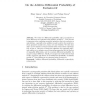Free Online Productivity Tools
i2Speak
i2Symbol
i2OCR
iTex2Img
iWeb2Print
iWeb2Shot
i2Type
iPdf2Split
iPdf2Merge
i2Bopomofo
i2Arabic
i2Style
i2Image
i2PDF
iLatex2Rtf
Sci2ools
104
click to vote
FSE
2004
Springer
2004
Springer
On the Additive Differential Probability of Exclusive-Or
We study the differential probability adp of exclusive-or when differences are expressed using addition modulo 2N . This function is important when analysing symmetric primitives that mix exclusive-or and addition--especially when addition is used to add in the round keys. (Such primitives include idea, Mars, rc6 and Twofish.) We show that adp can be viewed as a formal rational series with a linear representation in base 8. This gives a linear-time algorithm for computing adp , and enables us to compute several interesting properties like the fraction of impossible differentials, and the maximal differential probability for any given output difference. Finally, we compare our results with the dual results of Lipmaa and Moriai on the differential probability of addition modulo 2N when differences are expressed using exclusive-or. Keywords. Additive differential probability, differential cryptanalysis, rational series.
Related Content
| Added | 20 Aug 2010 |
| Updated | 20 Aug 2010 |
| Type | Conference |
| Year | 2004 |
| Where | FSE |
| Authors | Helger Lipmaa, Johan Wallén, Philippe Dumas |
Comments (0)

